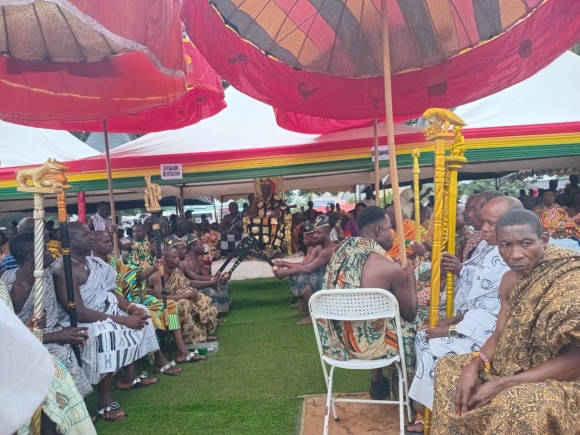The 2025 editions of the Pan-African Historical Theatre Festival (PANAFEST) and Emancipation Day celebrations have been climaxed with a gran durbar at Assin Manso in the Central Region, with powerful messages urging unity, accountability, and reparative justice for the African continent and its diaspora.
This year’s Emancipation celebration was marked under the theme: “Community development through environmental sustainability and tourism,” while PANAFEST was observed on the theme: “Let us speak of reparative justice: Pan-African Artistic Activism.”
The event brought together traditional leaders of the four traditional areas of Assin, government officials, members of the diaspora, and hundreds of Ghanaians to remember the painful history of slavery, reflected on the struggles of ancestors, and renew the commitment to Africa’s collective progress.
Cultural displays, including kete dances and Asafo company processions, added color and meaning to the event.
In her address, the Minister for Tourism, Culture and Creative Arts, Abla Dzifa Gomashie, reminded the gathering that the legacy of slavery may have begun centuries ago, but its effects were still felt today in many unjust systems and global inequalities.
She noted that Ghanaians should not simply stand on the trauma of the past, but draw strength from it to speak boldly and demand change.
She cautioned against treating members of the diaspora as mere visitors, adding that doing so signaled a failure to fully reckoned with the realities of slavery.
“We cannot act as if they do not belong. If they feel like visitors, it means slavery is still winning,” she said.
Reparative justice
The Minister further emphasized the event’s role in pushing for reparative justice, including calls for official apologies and concrete actions to address historical wrongs.
The Central Regional Minister, Ekow Panyin Okyere Eduamoah, echoed the need for national reflection.
He stated that if Ghana wanted the African diaspora to return and reconnect with their roots, the country should improved its systems, manage state resources wisely, and create opportunities that would make people feel at home.
He urged the diaspora to not only return but to work, invest, and learn their cultural heritage while demanding accountability from state actors.
The Paramount Chief of the Apemanim Traditional Area, Nana Kwame Nkyi XIII, used Revelations 22:1-3 to reflect on the painful consequences of divisions in the past and called for unity among Ghanaians and Africans at large.
He urged pastors across the country to pray for peace and development and emphasized that traditional leaders should resolved conflicts through peaceful means, not hostility.
The Executive Director of the PANAFEST Foundation, Rabbi Kohain Nathanya Halevi, raised concerns about perceptions that locals were unwelcoming to the diaspora.
He stressed that Africa should take control of its destiny and urged Africans both on the continent and abroad to hold one another accountable while working toward healing and unity.
“Before we heal the world, we must begin by healing ourselves and that healing must come with responsibility,” he noted.
Environmental protection
The District Chief Executive (DCE) for Assin South, Jonathan Birikorang, used the occasion to urge environmental protection as a key component of sustainable tourism.
He discouraged harmful practices such as illegal mining, deforestation, and river pollution, stating that the nation’s natural resources were not only a source of life but also potential attractions that could help reconnect Ghana with the diaspora.
African resilience
The Member of Parliament for Assin South, John Ntim Fordjour, highlighted the resilience of Africans despite the painful legacy of slavery.
He called for the establishment of a common cultural centre to promote deeper bonds between Ghanaians and the diaspora.
He also pointed out that about 75 per cent of castles used during the slave trade were located in Ghana, a reality that placed the country at the centre of global conversations about slavery, reparations, and historical accountability.
The Chief Executive Officer (CEO)of Crown Forest and Royal Ambassador of Tourism in the Central region, Nana Owuraba Abetsen joined calls for preserving culture and promoting sustainable tourism as a tool for development and diaspora engagement.
He also advocated for the establishment of Royal College of African Studies at Assin Manso to serve as a centre for research, heritage, and reconnection.
Chiefs and dignitaries later moved to the ancestral grave yard where wreaths were laid on behalf of government and the people, the diasporan community, the youth of Africa and traditional rulers.
They also visited the riverside at Assin Manso, the Slave river, a significant site where captured ancestors took their last bath before traveling on foot to the slave castles to pour libation in remembrance of the suffering and strength of the ancestors.

